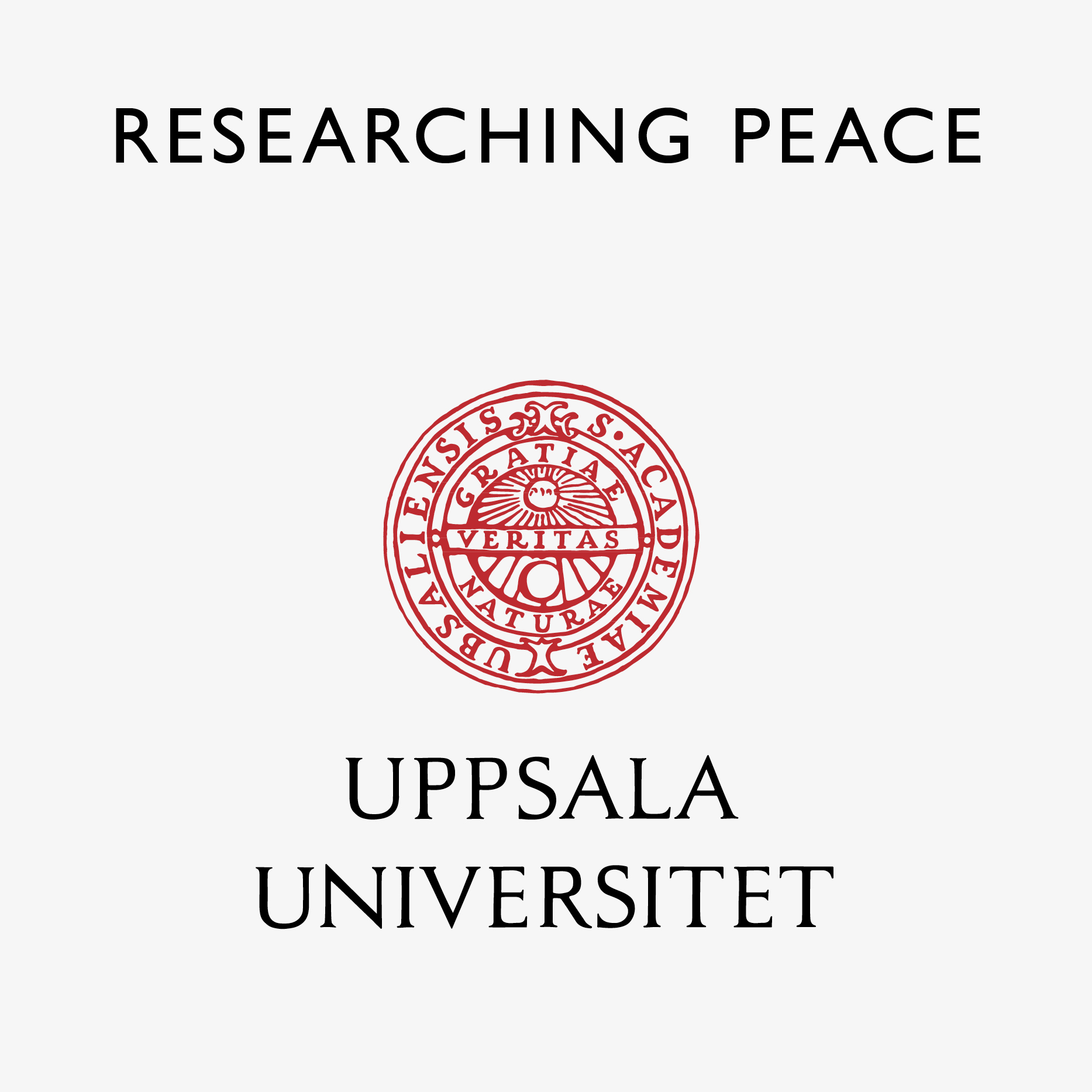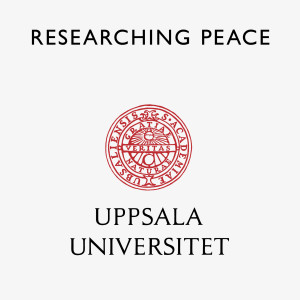

17.2K
Downloads
73
Episodes
Why do armed conflicts happen? How can we achieve lasting peace? In the Researching Peace podcast, you will meet the leading researchers in peace and conflict research and other experts in the field. Researching Peace is produced by the Department of Peace and Conflict Research at Uppsala University. Some episodes are produced in collaboration with the Alva Myrdal Centre for Nuclear Disarmament and focus on issues of nuclear disarmament and non-proliferation. The views expressed in the podcast are those of each contributor and do not represent the official position of either the University or the Department. More about us Department of Peace and Conflict Research - Uppsala University
Episodes

Wednesday Dec 22, 2021
#12 Peace Research in the Global South
Wednesday Dec 22, 2021
Wednesday Dec 22, 2021
How is peace research perceived in different places around the world? Do the perceptions remain the same when we move from a research environment in the global north to another in the south? If there is variation, what is the reason behind it? In this episode, Pedro Valenzuela -Professor of International Relations at the Javeriana University- and Angela Muvumba Sellström -Senior Researcher at the Nordic Africa Institute and affiliated to Uppsala University’s Department of Peace and Conflict Research- talk about how peace research is viewed in the global south. They highlight the value of global partnerships and collaborations shaping the perceptions on this particular research field. Valenzuela and Sellström also discuss how researchers, practitioners, and policymakers can help create a fertile climate for peace by participating in outreach programs.
Researching Peace is a podcast from the Department of Peace and Conflict Research at Uppsala University, hosted by Professor Isak Svensson.

Monday Dec 13, 2021
#11 Doing Field Research
Monday Dec 13, 2021
Monday Dec 13, 2021
What are the ethical challenges of conducting field research in conflict-affected areas? In this episode, Prakash Bhattarai -the Founder and Executive Director of Center for Social Change- and Karen Brounéus - Associate Professor of Peace and Conflict Research at Uppsala University- talk about their experiences in the field, including in post-war Nepal, and they highlight some of the perils of doing field research. In addition, they underline the significance of creating a research culture of reflection and honesty. Sharing and learning from mistakes might be the key to building this culture, according to Bhattarai and Brounéus.
Researching Peace is a podcast from the Department of Peace and Conflict Research at Uppsala University, hosted by Professor Isak Svensson.

Thursday Nov 25, 2021
#10 Predicting Armed Conflicts
Thursday Nov 25, 2021
Thursday Nov 25, 2021
Is it possible to forecast when and where violence will escalate in the future? In this episode, Håvard Hegre -Dag Hammarskjöld Professor of Peace and Conflict Research at Uppsala University and Research Professor at the Peace Research Institute Oslo- talks about how he approaches to the question of prediction in peace studies. As the leader of the Violence Early-Warning System (ViEWS) project, Hegre explains the main components of a machine learning-based conflict forecast model. He also mentions various ethical dimensions of producing publicly available predictions.
Researching Peace is a podcast from the Department of Peace and Conflict Research at Uppsala University, hosted by Professor Isak Svensson.

Thursday Oct 07, 2021
#9 Diplomacy & Peace Research
Thursday Oct 07, 2021
Thursday Oct 07, 2021
How can peace research play a role in the developments in international relations and diplomacy? How does the interaction between theory and practice work in the context of peace and conflict? In this episode, Jan Eliasson - Honorary Doctor of Uppsala University, former Deputy Secretary-General of the UN, and former Swedish Minister of Foreign Affairs - talks about his experiences of interacting with peace research in his diplomatic efforts. He provides significant insights on the value of evidence-based policies and scientifically grounded policies in the field of peacebuilding and international mediation. In this regard, he emphasizes the role of the DPCR and SIPRI (Stockholm International Peace Research Institute), especially in peace efforts led by Swedish researchers and policymakers around the world.
Researching Peace is a podcast from the Department of Peace and Conflict Research at Uppsala University, hosted by Professor Isak Svensson.

Thursday Sep 02, 2021
#8 Researching Conflicts Ethically
Thursday Sep 02, 2021
Thursday Sep 02, 2021
How should peace researchers reflect on ethics in their studies? What are the key challenges that they are likely to face while investigating on the ground in the conflict zones? Are ethical review boards really necessary? In this episode of Researching Peace, Kristine Höglund -Professor of Peace and Conflict Research at Uppsala University- talks about how to conduct peace research in an ethical manner. She also points out the significance of a rarely-addressed facet of the research ethics debates i.e. the climate responsibilities of the academia.
Researching Peace is a podcast from the Department of Peace and Conflict Research at Uppsala University, hosted by Professor Isak Svensson.

Tuesday Jun 15, 2021
#7 Collecting Conflict Data
Tuesday Jun 15, 2021
Tuesday Jun 15, 2021
Why do we need data on conflicts in order to understand peace? The Uppsala Conflict Data Program (UCDP) has been collecting systematic information on organized violence around the world for almost 40 years. In this episode of Researching Peace, the UCDP’s program director Magnus Öberg and project manager Therese Pettersson explain the logic and practice of collecting conflict data and they highlight what makes the UCDP one of the leading data sources in the field of peace and conflict research. Öberg and Pettersson also talk about the recent trends in organized violence in light of the newly released UCDP Georeferenced Event Dataset 21.1.
Researching Peace is a podcast from the Department of Peace and Conflict Research at Uppsala University, hosted by Professor Isak Svensson.

Tuesday Jun 01, 2021
#6 Resisting without Violence
Tuesday Jun 01, 2021
Tuesday Jun 01, 2021

Wednesday May 05, 2021
#5 Responding to Conflict
Wednesday May 05, 2021
Wednesday May 05, 2021

Monday Apr 12, 2021
#4 Understanding Peace and Conflict Research
Monday Apr 12, 2021
Monday Apr 12, 2021
Peace research seeks to understand the causes, dynamics, and resolution of armed conflicts and organized violence. In this episode, Kjell-Åke Nordquist – Professor of International Relations at the University College Stockholm- is talking about the origins and the evolution of peace and conflict research in Uppsala. As a former Head of the Department of Peace and Conflict Research, he is narrating how he was trained as a peace researcher and how the training had changed over time. He is also sharing how his experiences as a peace researcher helped him in different conflict settings, especially while he was acting as a facilitator in East Timor.
Researching Peace is a podcast from the Department of Peace and Conflict Research at Uppsala University, hosted by Professor Isak Svensson.

Friday Mar 19, 2021
#3 Being on the Ground
Friday Mar 19, 2021
Friday Mar 19, 2021
Conflict-ridden areas are at the focus of peace research in academia. But how does it feel to be on the ground? In this episode, Jamie LeSueur -Head of Emergency Operations at the International Federation of Red Cross and Red Crescent Societies (IFRC) and Uppsala University Alumnus of the Year (2020)- shares some insights on his daily work as a practitioner and talks about how his time in Uppsala has been affecting his decisions at IFRC. As a master's graduate from the Department of Peace and Conflict Research, LeSueur emphasizes that a degree in this field provides "a taste of what reality looks like" and being on the ground may provide even more.
Researching Peace is a podcast from the Department of Peace and Conflict Research at Uppsala University, hosted by Professor Isak Svensson.